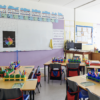The Gift of Unplugged Learning this Holiday Season

The holiday season, synonymous with joy, family gatherings, and festive activities, presents a golden opportunity for students to detach from their digital screens and reconnect with the world around them. In an era where screens dominate our lives, there’s a growing realization of the increased need for unplugged learning opportunities for our young kids and teens.
Why a Digital Detox Matters
Too much screen time and the barrage of digital information can be overwhelming. Studies indicate that excessive screen time can lead to decreased attention spans and disrupted sleep patterns. As if these issues weren’t detrimental enough, it can also lead to an overall sense of mental fatigue. For students, this can hinder their ability to absorb information, curtail creativity, and impair their emotional well-being.
Embracing Hands On
The holidays can be an opportune time to introduce children and teenagers to tangible, hands-on activities. Whether constructing a gingerbread house, writing handwritten letters to loved ones, or diving into a captivating book – unplugged activities can stimulate the brain in unique ways, fostering deeper levels of creativity and comprehension.
Benefits Beyond the Break
While the immediate perks of a digital detox – improved sleep, better focus, enhanced creativity – are evident, the long-term benefits are equally compelling. Reducing screen dependence cultivates better social skills, fosters more profound interpersonal connections, and instills a sense of mindfulness. It prepares students to tackle their studies with renewed energy and vigor when they return to school.
Encouraging the Detox
Parents and educators can play a pivotal role in encouraging unplugged learning opportunities. Consider gifting board games, craft kits, or books. Organize group activities that don’t involve screens, or simply encourage students to spend time outdoors.
Ideas for Unplugged Learning
- Nature Walks & Scavenger Hunts: Exploring local parks or forests can be educational. Create a list of items or species for kids to identify, fostering observational skills.
- DIY Science Experiments: From homemade volcanoes to crystal growing kits, hands-on science projects can be both fun and educational.
- Cooking & Baking: Following recipes can enhance mathematical skills (measuring ingredients) and understanding of science (how ingredients interact).
- Board Games: Classic games like “Monopoly” or “Scrabble” can teach kids about money, strategy, vocabulary, and more.
- Crafting & Art Projects: Painting, sculpting, or even simple craft projects encourage creativity while fine-tuning motor skills.
- Music: Learning to play a musical instrument or even just listening and identifying different instruments in a song can be an enriching experience.
- Storytelling & Drama: Encourage kids to create their own plays or stories. This bolsters creativity, vocabulary, and public speaking skills.
- Puzzles & Brain Teasers: These challenge the mind, improving problem-solving skills and concentration.
Guiding the Detox Journey
Parents and educators can be the catalysts for this transition. Setting designated tech-free hours, gifting non-digital games, or organizing group activities can make a significant difference.
In wrapping up, this holiday season, let’s reintroduce our students to the joys and learning opportunities that the world outside screens has to offer. Here’s to a season of discovery, creativity, and genuine connections!
Extra info: If you’ve wondered how to become a teacher so that you can help guide young learning, find out how American Board’s online teacher certification program can help you.





